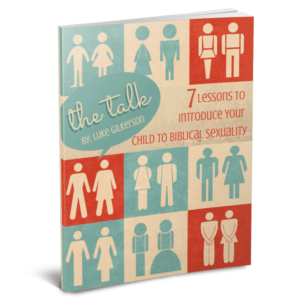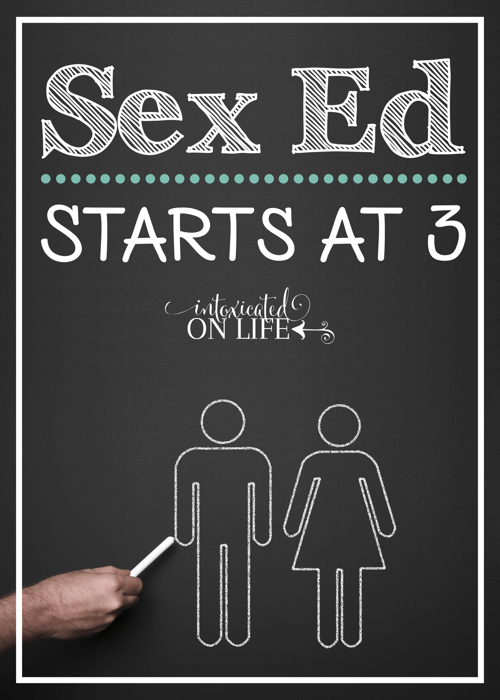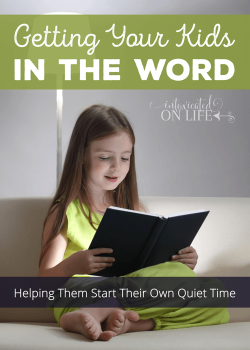My 3 year old son burst through the bathroom door and gasped when he saw me, “What happened to your penis?!” he exclaimed. (Note to self: fix the bathroom door lock.)
He was horrified.
“Did it fall in the potty?” he questioned.
“Did you cut it off?” he wondered out loud.
He simply could not contemplate why mommy did not look the same as daddy and his brothers.
Laughing, I quickly shooed him out of the bathroom. When I was done I found him so we could have a chat about his recent discovery: female anatomy is different from male anatomy.
Sex ed shouldn’t start when a child is an adolescent. It shouldn’t begin with an entire arsenal of information all at once. No, sex ed conversations can begin when a child is a preschooler. It begins simply. Naturally.
7 Key Concepts to Teach your Preschooler
Children are naturally curious. They want to know about the world around them. And even if they don’t ask the specific questions, there are lessons that are easy to talk with your young child about.
Below are 7 primary concepts that we’d encourage you to address with your preschooler.
1. God created you.
One of the most basic of lessons is we have a Creator. God created all things. The Bible is the perfect way to introduce this topic. Do you have a children’s Bible you read with your preschooler? This lesson probably has already come up if you do.
2. God made both males and females.
This is also probably a lesson that has come up if you regularly read a children’s Bible with your kids. When God created humans, he first created Adam and then he created Eve. Spend time talking about who your children: Who do you know that are boys? Who do you know that are girls?
3. Males and females have different body parts.
While the primary identifiers your children will use to differentiate males and females will be their outward appearance, it is important for this lesson to eventually be touched on. This is the lesson my 3-year-old son learned that day he walked in on me in the bathroom, but you don’t need to wait for such an encounter to have this conversation.
4. Correct names of body parts.
When I was a new mama and my first son used the word “penis” in front of a family member, I thought she was going to have a heart attack.
“Why in the world would you teach him that word?!” she exclaimed. “What if he says it in public?” she questioned.
To which I responded, “So what if he does?”
Is it any more embarrassing for our boys to use the word penis than if they use the word ‘wee wee’ or any of the other slang words parents teach their kids?
While I find that the embarrassment and indignation over children using correct body parts, by and large, comes from an older generation, there are still some in my generation that can’t fathom talking to their children and telling them what their body parts are correctly called.
If you are one such parent, I’d urge you to begin giving your children correct terminology now. Children need to know that boys have a penis and testicles. Children need to know that girls have a vulva and a vagina. When your children lay their head on you and ask what those cushy bumps on your chest are, don’t hesitate in telling them that they are your breasts.
These are all normal words that help us communicate.
When you begin having more talks as your kids get older, it will be infinitely easier and less embarrassing for you both if they already know some of the terminology. We do not want our children to have a negative stigma or feel shame over body parts. If we put out the vibe that these are gross or embarrassing words, our kids will pick up on it.
Furthermore, children need to be able to be able to identify using correct language if certain parts hurt or if they’ve been touched inappropriately.
Having the correct language makes communicating accurately possible. There is absolutely nothing to be ashamed about.
5. Babies have both a mommy and a daddy.
It takes both a mommy and a daddy to make a baby. Even if both parents aren’t in a home, children need to know that it takes both sexes to make a baby.
6. Your private parts are to be kept private.
I have four boys. Four wonderful, rambunctious boys. When they are little, they have absolutely no problems running around naked in front of the world! This is one lesson, we’ve had to teach our boys.
It’s not always appropriate to be naked. In fact, most of the time, to their displeasure, they must wear clothes and keep their private parts covered.
7. You can always ask mommy and daddy questions.
This is something you want to tell them over and over again. Don’t let them forget that you are always available and willing to answer their questions!
What if your child asks you an uncomfortable question, or one you’re not prepared to answer? Or maybe right then is just not the best time to answer it. You can always tell your child, “That is a really good question! I want to sit down and talk to you about that, but right now isn’t the best time. Can we do it tonight after I put your brother to bed (indicate a specific time)?”
This will give you time to think through how to answer their question without acting uncomfortable or embarrassed.
Sex ed should be a natural revealing of information. Talk to your child at their level. Give them just the right amount of information.
What Comes Next?
Most preschoolers aren’t ready to have “the talk” yet—not because sex is naughty, but because they’re not cognitively ready to dialogue about the mechanics of sex. This talk needs to happen once they have the vocabulary and understanding. But we encourage parent’s not to wait too long for this.
Want to know why we encourage parents to talk to their kids about the basics of sex early? We’d invite you to read this article.

- The Talk is a series of lessons using the Bible as a starting point for introducing your children to sex.
- It is geared towards children ages 6-9 years old.
- It provides talking points, pictures, and questions to help you have engaging meaningful discussions with your kids.
Here’s what just a few parent’s have to say about The Talk.
This is exactly what we were looking for in a resource for ‘the talk.’ It is easy to use, clear, Bible-based, & God-honoring. I like how the lessons give just enough information for younger children yet are a great springboard for further discussion with older children. -Kelly
Straight out of the Word! Not watered down. Full of wisdom in the first part on how to deal with the awkardness we felt … And might still feel as parents! I wish my parents got hold of this book. If you don’t teach your children society will! It’s biblical. Practical and to be used as a family study. Open and honest. Easy to understand. – Rista
I found this to be a perfect resource for “breaking the ice” before the world does. I can give him more info later, but it was perfect to introduce the subject with my oldest son and cover all my bases for the first round. Thank you! – Mrs. Massey
You can check out the details on what each of the 7 lessons covers here.












This is so great and something I wish my parents had been better about. I love that you always are trying to think about how your actions as a parent are preparing your kids to be teenagers and adults by providing the means (correct terminology) and methods of communication (ask mommy and daddy and if they can’t do it now they’ll get back to you) at such a young age. This is one topic especially that you don’t want your kids’ sole source to be modern culture and if they can’t talk to you about it guaranteed it will be.
I just wanted to mention a reference for adults looking to discuss sex and relationships from a Christian perspective. My friend Francie Winslow talks openly about this topic on her site franciewinslow.com. It is so important for Christians not to be afraid of sex or uncomfortable discussing it with kids and family, because if we’re not talking openly about this the Christian community won’t be the place people go to get information about it. I certainly wish I had been more comfortable talking to good Christian mentors and receiving Christ like advice! Thanks Trisha
Yes, you’re right. This definitely isn’t a conversation to leave up to modern culture! Our culture is plenty willing to educate our children if we don’t.
Thank you for sharing the resource!
My daughter is 6 and I’m pregnant so I know the talk about how the baby got there is coming. Thank you for the book recommendation.
What a natural time to talk to your daughter about fetal development and babies and how they get there. Best of luck with your pregnancy!
We subscribe to this line of thinking. Baby Boy, at 2, knows that Momma’s private is different from his and Papa’s. He also has a loosely-broad understanding that no one is to touch another’s privates. One night, as we were all going to bed, he randomly told Hun not to touch my private, although Hun wasn’t (of course) lol! Learning really is a process and the small pieces that we give our children now are important for the larger pieces later! 🙂
Exactly! Sounds like you’re doing a great job with teaching your 2 year old concepts he can understand 🙂
I agree – what a great conversation to begin at an early age (and isn’t it so much easier when we’re not dreading the day of “The Talk” when it’s totally out of the blue?) I have a three-year-old, so very timely!
I found you via Mama Moments… thanks for sharing! 🙂
Yes, it really does make things so much easier when you’re not laying ALL the information on the table all at once for the very first time. It can be a natural progression. It doesn’t have to be one big dreaded “Talk”
As a kindergarten teacher, I heartily approve of this philosophy! Great post! Found you via making your home sing link-up. 🙂
Thank you! 🙂
Thank you! My husband and I have been talking about the way we want to handle the topic of sex with out future children. We feel this is something that most Christian parents (and parents in general) completely butcher. Acting like it doesn’t exist only makes it more interesting and exciting to kids. And if you don’t give them the answers, they’ll find them from places you may not want them looking. We want to be very open and clear with our kids about sex. Thank you for sharing your thoughts on this!!!
I agree. I want my kids to feel comfortable enough from a young age to always feel they can come and ask my husband and I anything they want. I believe starting with conversations early, is the way to go.
I’m amazed at how many people can’t use proper terminology for genitals in a medical office. I had a staff member once who would put slang terms on medical charts because the anatomical words were dirty. Makes me crazy.
Wow, that’s a little crazy!
I love the ideas you put forth in this post!!! I really want my readers to know about this too! I want to share this in my weekly series called “Roll Out The Red Carpet Thursday” – I share bloggers’ amazing posts that I’ve found during the week. I hope that’ ok! Have a great night!
Thank you Danielle! We certainly appreciate you sharing about our post 🙂
We have always used the correct terms… and my son knows that biys have penises and girls have vaginas… we also say crotch when talking about the whole area in general (which was awkward after taking him to the ER due to a yeast infection in his crotch area, at my appt for my pregnancy he announced to a stranger we were there so the doctor could make mommy’s crotch feel better, lol)… and still one day he burst in the bathroom and demanded I “point my crotch down” (he is 2.5). I told him Mommy didn’t have to point her crotch down because she has a vagina and he has a penis. He nodded and agreed “yeah a vagina” and went on with his day. I think this definitly helps raise comfort levels so when he is older he will be more willing to talk to me about feelings/problems that arise.
Funny story! (I’m sure it wasn’t at the time though) 🙂
Ohhhh, this information and guidance is so valuable! And #7 is critical – can’t be reminded of that enough. 🙂 Thank you for sharing it at Works for Me Wednesday.
What i say if my child is an intersex person? :/
Are you saying your child has genitalia that is neither clearly male or female?
Yes, 1% of the world’s population are intersex people.
Thank you for clarifying, Marie.
If about 1% of the world’s population is intersex, as you claim, you might be using a broader definition than this. If you just mean those whose internal and external genitalia is inconsistent with their chromosomal sex, then the percentage is probably much lower (around 0.018%). This is at least what the Journal of Sex Research says.
Regardless of the exact percentage, if my child was intersex, I would still teach them all the above points mentioned in this article. As far as their own biology was concerned, it would depend on exactly what the nature of their condition was. Perhaps you could be more specific about your own child’s case so I can give a more precise answer.
We found the book “God Made All Of Me” by Justin and Lindsey Holcomb. It is wonderfully written and a great starter book for littles. I read it to mine as soon as they are old enough to sit and listen. My son is 7 now, so I think “the talk” will be coming right up. We also are farmers, so the concept of mating to produce offspring is not new to our kids. They know that Daddy put each of them in my belly, but haven’t asked how yet. Trying to prepare for when they do.